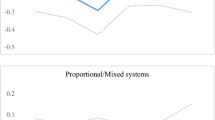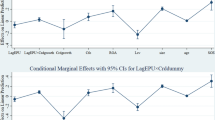Abstract
This paper documents the cycles in corporate investments around national elections in Pakistan from 2000 to 2016. It employed the investment-Q model as the baseline specification with firm fixed effects. Results revealed that during election years, firms tend to reduce investment expenditures as compared to a period having no election after controlling for firm characteristics and economic condition. The study also witnessed pre-election manipulation and the presence of the political business cycle in Pakistan in the period leading up to the national election. This study witnessed variations in the impact of political uncertainty across elections and found more pronounced investment cycle for close contested elections. It also revealed negative changes in investments around national elections for market-friendly and lagged investments; however, results of sensitive industries were insignificant for Pakistan. Furthermore, empirical findings reveal that cashflows levels are consistent with the cautionary effect predicted by the real options theory which proposes that firms hold more cash in the period of high political uncertainty and wait until the uncertainty regarding political uncertainty is resolved. The results of this paper suggest that there should be a consensus between political parties on key economic policies so that even with the change of government; the key policies should remain the same.

Similar content being viewed by others
Data availability
The data used in this research paper is available on request. For data, please contact on.
email(malik.fah@gmail.com).
Notes
Known as ‘General Elections’ in Pakistan where legislature at national and provincial level are elected directly by public voting.
Pakistan Stock Market (PSX) has been termed as world’s 4th best performing stock market, whereas in 2016 it was considered as “Asia’s best performer” (http://bit.ly/psxnews).
Pakistan People's Party (PPP) and ANP (Awami National Party) are classified as left-wing centered parties, whereas Pakistan Tehreek-e-Insaf (PTI) and Pakistan Muslim League–Nawaz Group (PML(N)) are classified as right centrist parties. MuttahidaMajlis e Amal (MMA) is classified as a right wing party, while Muttahida Qaumi Movement (MQM) is classified as a centrist party.
Abbreviations
- PBH:
-
Political business cycle
- GDP:
-
Gross domestic product
References
Akhmedov, A., Zhuravskaya, E.: Opportunistic political cycles: Test in a young democracy setting. Quart. J. Econ. 119(4), 1301–1338 (2004). https://doi.org/10.1162/0033553042476206
Alesina, A., Perotti, R.: Income distribution, political instability, and investment. Eur Econ Rev 40(6), 1203–1228 (1996). https://doi.org/10.1016/0014-2921(95)00030-5
Alesina, A., Roubini, N., Cohen, G.D.: Political cycles and the macroeconomy. MIT Press (1997)
Amore, M.D., Minichilli, A.: Local political uncertainty, family control, and investment behavior. J Financial Quant. Anal 53(4), 1781–1804 (2018). https://doi.org/10.1017/S002210901800025X
An, H., Chen, Y., Luo, D., Zhang, T.: Political uncertainty and corporate investment: Evidence from China. J Corp. Finance 36, 174–189 (2016). https://doi.org/10.1016/j.jcorpfin.2015.11.003
Arellano, M., Bover, O.: Another look at the instrumental variable estimation of error-components models. J. Econ. 68(1), 29–51 (1995). https://doi.org/10.1016/0304-4076(94)01642-D
Baker, S.R., Bloom, N., Davis, S.J.: Measuring economic policy uncertainty. Quart. J. Econ. 131(4), 1593–1636 (2016). https://doi.org/10.1093/qje/qjw024
Baum, C.F., Chakraborty, A., Liu, B.: The impact of macroeconomic uncertainty on firms’ changes in financial leverage. Int. J. Finance Econ. 15(1), 22–30 (2010). https://doi.org/10.1002/ijfe.406
Bechtel, M.M., Füss, R.: Capitalizing on partisan politics? the political economy of sector-specific redistribution in Germany. J. Money Credit Bank. 42(2–3), 203–235 (2010). https://doi.org/10.1111/j.1538-4616.2009.00285.x
Bernanke, B.S.: Irreversibility, uncertainty, and cyclical investment. Q. J. Econ. 98(1), 85–106 (1983)
Blundell, R., Bond, S.: Initial conditions and moment restrictions in dynamic panel data models. J. Econ. 87(1), 115–143 (1998). https://doi.org/10.1016/S0304-4076(98)00009-8
Boutchkova, M., Doshi, H., Durnev, A., Molchanov, A.: Precarious politics and return volatility. Rev. Financ. Stud. 25(4), 1111–1154 (2012). https://doi.org/10.1093/rfs/hhr100
Brogaard, J., Detzel, A.L.: Policy uncertainty the asset-pricing implications of government economic policy uncertainty. Manag. Sci. 61(1), 3–18 (2015)
Budge, I., Klingemann, H.-D., Volkens, A., Bara, J., Tanenbaum, E. (2001). Mapping policy preferences: Estimates for parties, electors, and governments 1945–1998 (vol 1). In Mapping Policy Preferences Estimates for Parties Electors and Governments 194598. Oxford University Press. https://doi.org/10.1017/CBO9781107415324.004
Caballero, R.J., Pindyck, R.S.: Uncertainty, investment, and industry evolution. Int. Econ. Rev. 37(3), 641 (1996). https://doi.org/10.2307/2527445
Canes-Wrone, B., Park, J.K.: Electoral business cycles in OECD countries. Am. Polit. Sci. Rev. 106(1), 103–122 (2012). https://doi.org/10.1017/S0003055411000529
Cao, C., Li, X., Liu, G.: Political uncertainty and cross-border acquisitions. Rev. Finance 23(2), 439–470 (2019). https://doi.org/10.1093/rof/rfx055
Chen, Z., Cihan, M., Jens, C., Page, T.B.: Political uncertainty and firm investment: Project-level evidence from M&A activity. SSRN (2018). https://doi.org/10.2139/ssrn.2807242
Cole, S.: Fixing market failures or fixing elections? agricultural credit in India. Am. Econ. Journal: Appl. Econ. 1(1), 219–250 (2009). https://doi.org/10.1257/app.1.1.219
Cukierman, A., Edwards, S., Tabellini, G.: Seigniorage and political instability. Am. Econ. Rev. 82(3), 537–555 (1992)
Dai, L., Ngo, P.: Political uncertainty and accounting conservatism. Eur. Account. Rev. (2020). https://doi.org/10.1080/09638180.2020.1760117
Dinç, I.S.: Politicians and banks: Political influences on government-owned banks in emerging markets. J. Financ. Econ. 77(2), 453–479 (2005). https://doi.org/10.1016/j.jfineco.2004.06.011
Drazen, A. (2001). The political business cycle after 25 years. In: Ben, S. Bernanke, K. Rogoff (Eds.), NBER Macroeconomics Annual 2000, Volume 15 (pp. 75–138). MIT Press. https://www.nber.org/chapters/c11055.pdf
Drazen, A., Eslava, M.: Electoral manipulation via voter-friendly spending: Theory and evidence. J. Dev. Econ. 92(1), 39–52 (2010). https://doi.org/10.1016/j.jdeveco.2009.01.001
Durnev, A. (2010). The real effects of political uncertainty: Elections and investment sensitivity to stock prices. Paris December 2010 Finance Meeting EUROFIDAI-AFFI. Available at SSRN. http://dx.doi.org/https://doi.org/10.2139/ssrn.1549714
Eberly, J., Rebelo, S., Vincent, N. (2008). Investment and value: A neoclassical benchmark (NBER Working Paper No. 13866). https://www.nber.org/papers/w13866.pdf
Falk, N., Shelton, C.A.: Fleeing a lame duck: Policy uncertainty and manufacturing investment in US states. Am. Econ. Journal: Econ. Policy 10(4), 135–152 (2018). https://doi.org/10.2307/26529056
Faust, J., Irons, J.S.: Money, politics and the post-war business cycle. J. Monetary Econ. 43(1), 61–89 (1999). https://doi.org/10.1016/S0304-3932(98)00046-4
Fernández-Villaverde, J., Guerrón-Quintana, P., Kuester, K., Rubio-Ramírez, J.: Fiscal volatility shocks and economic activity. Am. Econ. Rev. 105(11), 3352–3384 (2015). https://doi.org/10.1257/aer.20121236
Franzese, R.J.: Electoral and partisan cycles in economic policies and outcomes. Annu. Rev. Polit. Sci. 5(1), 369–421 (2002). https://doi.org/10.1146/annurev.polisci.5.112801.080924
Gao, P., Murphy, D., Qi, Y. (2019) Political uncertainty and public financing costs : Evidence from U.S. gubernatorial elections and municipal bond markets disclosure. In Working Paper (Issue 574). https://doi.org/10.2139/ssrn.1992200
Gilchrist, S., Sim, J. W., Zakrajšek, E. (2014). Uncertainty, financial frictions, and investment dynamics (NBER Working Paper 20038). https://www.nber.org/papers/w20038.pdf
Gulen, H., Ion, M.: Policy uncertainty and corporate investment. Rev. Financial Stud. 29(3), 523–564 (2016). https://doi.org/10.1093/rfs/hhv050
Herron, M.C., Lavin, J., Cram, D., Silver, J.: Measurement of political effects in the United States economy: A study of the 1992 presidential election. Econ. Politics 11(1), 51–81 (1999). https://doi.org/10.1111/1468-0343.00053
Hibbs, D.A.: Political parties and macroeconomic policy. Am. Polit. Sci. Rev. 71(4), 1467–1487 (1977)
Hillman, A.J., Hitt, M.A.: Corporate political strategy formulation: A model of approach, participation, and strategy decisions. Acad. Manag. Rev. 24(4), 825–842 (1999). https://doi.org/10.5465/AMR.1999.2553256
Jens, C.E.: Political uncertainty and investment: Causal evidence from US gubernatorial elections. J. Financial Econ. 124(3), 563–579 (2017). https://doi.org/10.1016/j.jfineco.2016.01.034
Julio, B., Yook, Y.: Political uncertainty and corporate investment cycles. J. Finance 67(1), 45–83 (2012). https://doi.org/10.1111/j.1540-6261.2011.01707.x
Kalecki, M.: Political aspects of full employment. Polit. Q. 14(4), 322–330 (1943)
Kang, W., Lee, K., Ratti, R.A.: Economic policy uncertainty and firm-level investment. J. Macroecon. 39, 42–53 (2014). https://doi.org/10.1016/j.jmacro.2013.10.006
Keech, W.R. (1995). Economic politics: the costs of democracy, 1st ed. Cambridge University Press
Leahy, J.V., Whited, T.M.: The Effect of Uncertainty on Investment: Some Stylized Facts. J. Money, Credit Bank. 28(1), 64 (1996). https://doi.org/10.2307/2077967
Lewis-Beck, M.S.: Economics and the American voter: Past, present, future. Polit. Behav. 10(1), 5–21 (1988). https://doi.org/10.1007/BF00989377
Li, Q., Lin, C., Xu, L.: Political investment cycle of state-owned enterprises. SSRN Electron J (2016). https://doi.org/10.2139/ssrn.2869529
Mattozzi, A.: Can we insure against political uncertainty? Evidence from the US stock market. Public Choice 137(1–2), 43–55 (2008). https://doi.org/10.1007/s11127-008-9311-0
Nordhaus, W.: The political business cycle. Rev. Econ. Stud. 42(2), 169–190 (1975)
Pindyck, R.S.: Irreversible investment, capacity choice, and the value of the firm. Am. Econ. Rev. 78(5), 969–985 (1988)
Pindyck, R.S.: Irreversibility, uncertainty, and investment. J. Econ. Literature. 29(3), 1110–1148 (1991)
Riem, M. (2016). Corporate investment decisions under political uncertainty (No. 221; Ifo Working Paper Series No 221). https://www.cesifo-group.de/DocDL/wp-2016-221-riem-corporate-investment-decisions.pdf
Rodrik, D.: Policy uncertainty and private investment in developing countries. J. Dev. Econ. 36(2), 229–242 (1991). https://doi.org/10.1016/0304-3878(91)90034-S
Rogoff, K., Sibert, A.: Elections and macroeconomic policy cycles. Rev. Econ. Stud. 55(1), 1 (2006). https://doi.org/10.2307/2297526
Roubini, N., Alesina, A.: Political cycles in OECD economies. Rev. Econ. Stud. 59(4), 663–688 (1992)
Sieg, G., Batool, I.: Pakistan, politics and political business cycles. Pak. Dev. Rev. 51(2), 153–166 (2012)
Swank, O.H.: Popularity functions based on the partisan theory. Public Choice 75(4), 339–356 (1993). https://doi.org/10.1007/BF01053443
Tabassam, A.H., Hashmi, S.H., Rehman, F.U.: Nexus between political instability and economic growth in pakistan. Procedia–Soc. Behav. Sci. 230, 325–334 (2016). https://doi.org/10.1016/j.sbspro.2016.09.041
Tufte, E.R. (1980). Political control of the economy. Princeton University Press
Veiga, L.G., Veiga, F.J.: Political business cycles at the municipal level. Public Choice 131(1–2), 45–64 (2007). https://doi.org/10.1007/s11127-006-9104-2
Willett, T.D., Keil, M.W.: Political business cycles. In: Rowley, C.K., Schneider, F. (eds.) The Encyclopedia of public choice, pp. 736–740. Springer, New york (2004)
Wolfers, J. (2007). Are voters rational?: Evidence from gubernatorial elections (NBER Working Paper). http://users.nber.org/~jwolfers/papers/Voterrationality(latest).pdf
Acknowledgments
I am very thankful to all my friends for their help and valuable suggestion regarding this research paper.
Funding
This research paper did not receive any financial aid from any source.
Author information
Authors and Affiliations
Contributions
MFB initiated the work and contributed to the methodology and analysis of data and interpreted results. ZA collected the required data for analysis and review the relevant literature. YBT write and proofread the draft and contributed in the discussion of the results. The author(s) read and approved the final manuscript.
Corresponding author
Ethics declarations
Conflict of interest
The authors declare that they have no competing interests.
Additional information
Publisher's Note
Springer Nature remains neutral with regard to jurisdictional claims in published maps and institutional affiliations.
Rights and permissions
About this article
Cite this article
Akbar, Z., Bashir, M.F. & Tariq, Y.B. An analysis of political uncertainty and corporate investment cycles in Pakistan. Qual Quant 55, 2271–2293 (2021). https://doi.org/10.1007/s11135-021-01116-8
Accepted:
Published:
Issue Date:
DOI: https://doi.org/10.1007/s11135-021-01116-8




